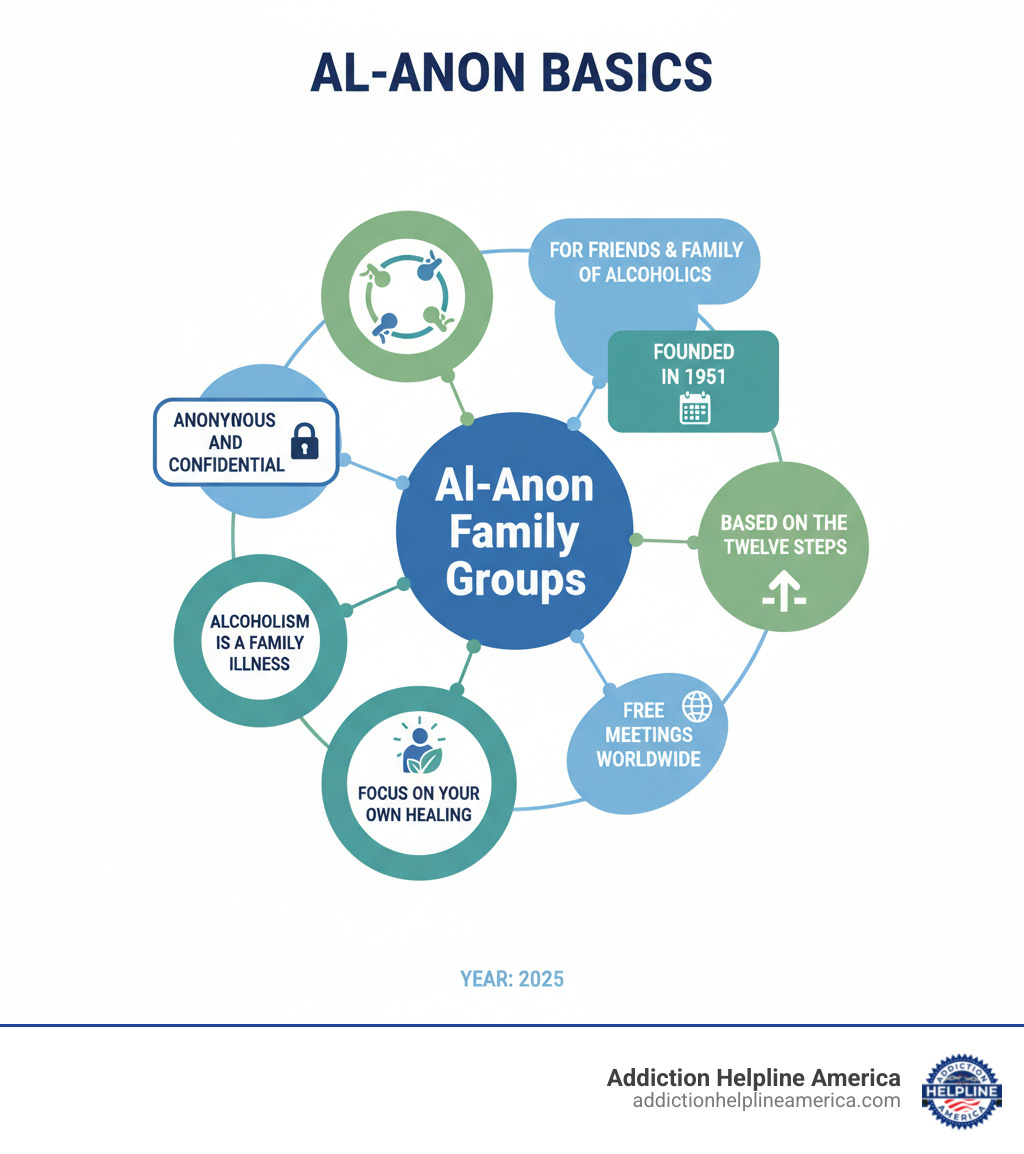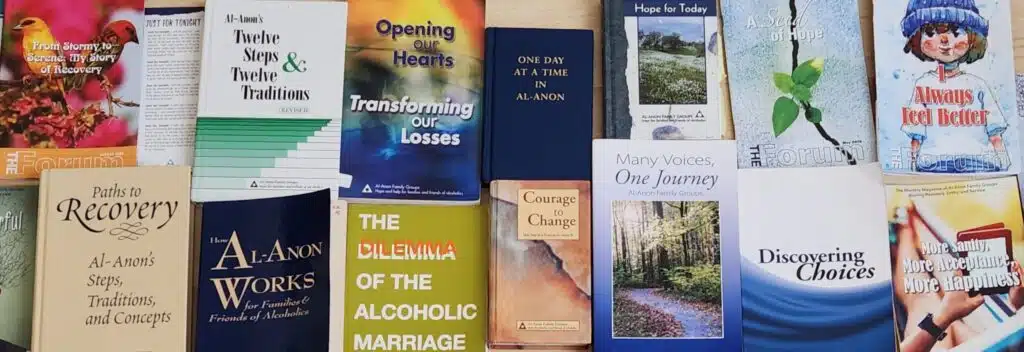
Why Al-Anon Family Groups Matter for Families Affected by Alcoholism
Al-Anon Family Groups are a worldwide fellowship providing support and hope for the families and friends of alcoholics. Whether the alcoholic is still drinking or not, Al-Anon offers a safe space to share experiences, learn coping strategies, and focus on your own healing.
Quick Facts About Al-Anon:
- Who It’s For: Anyone worried about someone else’s drinking—partners, parents, children, friends, or colleagues
- Purpose: To help families heal themselves, not to stop the alcoholic’s drinking
- Core Belief: Alcoholism is a family illness that affects everyone close to the person drinking
- Cost: Completely free; no dues or fees
- Where to Find Meetings: Available worldwide, both in-person and online
- Founded: 1951 by Lois W. and Anne B.
If you’re living with the chaos of a loved one’s alcoholism, you’re not alone. It’s common to feel hopeless, overwhelmed, or like you’ve lost yourself trying to fix their problem. You might blame yourself or feel like your life revolves around the drinker’s behavior.
Al-Anon teaches a simple but powerful truth: You didn’t cause it, you can’t control it, and you can’t cure it. This realization can be life-changing.
A Stanford University School of Medicine study found that Al-Anon newcomers who attended meetings for six months learned to better handle problems caused by the drinker, improved their own well-being, and experienced less verbal and physical abuse.
Based on the Twelve Steps (adapted from Alcoholics Anonymous), the program emphasizes personal spiritual growth and is not religious. In confidential meetings, members share stories, find solidarity, and learn to focus on their own recovery instead of trying to control the alcoholic.
At Addiction Helpline America, we understand how devastating alcoholism is for families. We’ve guided countless people toward support systems like Al-Anon Family Groups, connecting them with meetings, treatment options, and educational materials to help them heal.
The journey starts with understanding what Al-Anon is and how it works. This guide will walk you through everything you need to know.

What Are Al-Anon Family Groups and Who Are They For?
When someone you care about struggles with alcohol, it’s easy to feel like you’re drowning, too. Trying to control their drinking, cover up mistakes, or hold the family together can leave you exhausted and anxious.
Al-Anon Family Groups exist to help people like you find their way back to themselves.
At its heart, Al-Anon is a mutual support organization for anyone whose life has been affected by someone else’s drinking. This could be a spouse, parent, child, friend, or coworker. The person doesn’t need to admit they have a problem or seek treatment for you to benefit. This program is about your healing, not theirs.
Al-Anon is founded on the understanding that alcoholism is a family illness. It ripples outward, affecting everyone with guilt, shame, anxiety, and anger. You might feel responsible for the drinking, believing that if you just tried harder, they would stop. Al-Anon challenges these beliefs and offers a different path through shared experiences and mutual support.
A 2015 Member Survey in the U.S. and Canada showed that while many members were female (83%), white (93%), and married (61%), Al-Anon welcomes everyone regardless of background. If someone’s drinking affects your life, you are welcome.
Call Now – Your Journey to Recovery Begins Today!

Take the first step towards a healthier life! Call now to connect with our compassionate team and start your recovery journey today. Your path to healing awaits!
Our recovery specialists are available 24/7 to provide support, and all calls are confidential and free. Reach out anytime – we’re here to help!
How Al-Anon Differs from Alcoholics Anonymous (AA)
People often confuse Al-Anon with Alcoholics Anonymous (AA), but their focus is different. Understanding the distinction is key to getting the right support.
Alcoholics Anonymous (AA) is for people who want to stop drinking. Its focus is helping alcoholics achieve and maintain sobriety through shared experience and the Twelve Steps.
Al-Anon Family Groups, in contrast, is for the loved ones of alcoholics. Members seek to heal from the emotional and psychological damage caused by another’s drinking.
While the two programs are separate, they share a history and spiritual foundation. AA asks, “How do I stop drinking?” Al-Anon asks, “How do I stop letting someone else’s drinking control my life?” This shift in focus—from fixing the alcoholic to healing yourself—is at the core of Al-Anon’s power.
Understanding Alateen for Younger Members
Growing up with an alcoholic family member creates unique challenges for teenagers, who often feel isolated, confused, and responsible for the drinking.
Alateen, a part of the Al-Anon fellowship, provides a safe space where teenagers (typically ages 13 to 18) can meet peers who understand what they’re going through. Alateen is not for teens with drinking problems themselves; it’s for young people affected by someone else’s alcoholism.
In meetings, teens share experiences, learn about alcoholism as a family disease, and find healthy coping strategies. The program helps them realize they aren’t alone and aren’t responsible for the alcoholic’s behavior. Through the Twelve Steps of Alateen, they learn to build good lives for themselves, whether the alcoholic stops drinking or not.
Alateen meetings are led by an adult Al-Anon member who serves as a sponsor, ensuring a safe environment. A 2006 Alateen Member Survey showed a diverse group of young people finding hope, with an average age of 14. Like Al-Anon, Alateen welcomes all teenagers affected by a loved one’s drinking.
If you’re a young person struggling with a loved one’s drinking, Alateen offers a lifeline. At Addiction Helpline America, we can help you find Alateen meetings and other resources for young people.
The Core Principles and History of Al-Anon
Al-Anon has helped millions find peace for over 70 years. Its program is spiritual, not religious, welcoming people of all beliefs or none. The concept of a “Higher Power” is personal and can be whatever brings you strength, such as the group, nature, or the universe. Al-Anon is also self-supporting through voluntary contributions, with no dues or fees required to join.
The Founding Story: Lois W. and Anne B.
As Alcoholics Anonymous helped people get sober in the 1930s and 40s, their families realized they were still struggling with emotional wounds, even after the drinking stopped.
Lois W., wife of AA co-founder Bill W., was grateful for his recovery but found herself still angry and resentful. She realized she needed her own separate recovery program. Along with Anne B., another wife of an AA member, Lois founded Al-Anon Family Groups in 1951. Their vision was to create a safe place for families of alcoholics to share stories and find their own healing. You can read more in “Lois’ Story”.
Their approach recognized that families need their own recovery program. It wasn’t enough to support the alcoholic’s sobriety; loved ones had their own trauma and behaviors to unlearn.
The Three Legacies: Al-Anon’s Guiding Principles
Al-Anon is built on the Three Legacies, which serve as a blueprint for personal recovery and group operation.
The Twelve Steps, adapted from AA, are the heart of personal recovery. They guide members through self-examination to heal from the effects of another’s drinking. Explore The Twelve Steps of Al-Anon to learn more.
The Twelve Traditions keep groups healthy and unified. They ensure meetings stay focused on their primary purpose and protect the crucial principle of anonymity.
The Twelve Concepts of Service provide a leadership structure that keeps the program organized and true to its spiritual principles.
Perhaps the most liberating message is the Three C’s: You didn’t Cause it, you can’t Control it, and you can’t Cure it. Accepting this frees you to focus your energy on your own healing.
Anonymity is another cornerstone. What you hear and who you see in meetings stays confidential, creating a space of trust where real healing can happen.
Call Now – Your Journey to Recovery Begins Today!

Take the first step towards a healthier life! Call now to connect with our compassionate team and start your recovery journey today. Your path to healing awaits!
Our recovery specialists are available 24/7 to provide support, and all calls are confidential and free. Reach out anytime – we’re here to help!
At Addiction Helpline America, we’ve seen how these principles transform lives. The Three Legacies provide a roadmap that has worked for millions, and they can work for you too.
Attending Al-Anon: What to Expect, Benefits, and Resources

Attending your first Al-Anon Family Groups meeting can feel overwhelming, but these feelings are normal. Meetings are welcoming spaces where you can show up as you are, with no preparation needed. Many describe their first meeting as a relief—a place where they don’t have to explain their feelings.
What Happens Inside an Al-Anon Meeting?
Most meetings are small, with five to twenty-five people, creating a comfortable environment. They usually begin with the Serenity Prayer and a reading of Al-Anon’s purpose. A rotating chairperson, who is a member and not a professional, leads the meeting.
The core of the meeting is sharing. After a topic is introduced, members may share their experiences. Sharing is always voluntary; you can just listen for as long as you need without pressure to speak. Everything shared is held in strict confidentiality.
There are different meeting types, including Beginner meetings for newcomers, Speaker meetings where one person shares their story, Step Study meetings focusing on one of the Twelve Steps, and general Discussion meetings. Meetings last about an hour and often close with the Serenity Prayer.
Finding Hope and Healing: The Benefits of al anon family groups
Newcomers are often surprised that Al-Anon focuses on healing themselves, not on fixing the alcoholic. The benefits are profound:
- Emotional Support: A key benefit is realizing you’re not alone. The solidarity with others who have similar experiences is deeply healing.
- Releasing Guilt: Al-Anon teaches that you didn’t cause the alcoholism, you can’t control it, and you can’t cure it. This shift in perspective can lift years of self-blame.
- Addressing Codependency: Al-Anon helps with codependency, where you become overly focused on the alcoholic’s behavior. The program teaches detachment with love—learning to separate yourself emotionally from their choices while still caring for them.
Scientific research confirms that participation in 12-step groups like Al-Anon improves mental health, coping skills, and self-esteem. Al-Anon helps you refind your own worth and find your own path to serenity.
How to Find and Join al anon family groups
Joining is simple. There are no dues, fees, or referrals needed. You just need to be affected by someone else’s drinking.
- In-person meetings are held in community centers, churches, and libraries. To find one, visit Al-Anon’s meeting finder.
- Online meetings are widely available via video or phone. The Global Electronic Meeting list provides options for connecting virtually.
At Addiction Helpline America, we can help you steer these resources. For more information, you can explore pages like More info about Al-Anon and Alateen.
Resources Beyond Meetings

Beyond meetings, Al-Anon offers many resources to support your recovery journey:
- Conference Approved Literature (CAL): Books, pamphlets, and daily readers explore Al-Anon principles through members’ stories.
- “The Forum” magazine: This monthly publication features stories from members worldwide.
- “Al-Anon Faces Alcoholism”: An annual magazine for public outreach to help others find the program.
- Member Blog and Slogans: The Al-Anon member blog offers digital content, while simple slogans like “One Day at a Time” and “Let It Go” provide powerful anchors in difficult moments.
You can find these materials at the Al-Anon Online Store. These resources complement meetings, offering continuous support for your journey to peace.
Frequently Asked Questions about Al-Anon
It’s natural to have questions before attending Al-Anon Family Groups. Here are answers to some common ones.
Is Al-Anon only for the immediate family of alcoholics?
No. Al-Anon Family Groups is for anyone whose life has been affected by someone else’s drinking. This includes friends, colleagues, extended family, or partners. Your relationship to the person doesn’t matter. If their drinking is causing you distress, you belong in Al-Anon.
Do I have to be religious to join Al-Anon?
No, you don’t have to be religious. Al-Anon is a spiritual program, not a religious one. The concept of a “Higher Power” is personal. For some, it’s God; for others, it can be nature, the universe, or the group’s collective wisdom. The program welcomes people of all beliefs or no belief at all. The focus is on personal spiritual growth, not religious doctrine.
Does the alcoholic have to be in recovery for me to attend Al-Anon?
No. The alcoholic’s status doesn’t matter. You can benefit from Al-Anon Family Groups whether the person is actively drinking, in recovery, or even no longer in your life. You don’t need to wait for them to get help before you seek support for yourself.
Al-Anon’s focus is on your recovery, independent of the alcoholic’s choices. It teaches you to focus on what you can control: your own attitudes and reactions, so their drinking no longer dictates your life. Many members find peace even when the alcoholic continues to drink.
Your healing journey belongs to you. At Addiction Helpline America, we’ve seen countless families find hope through Al-Anon, and we’re here to help connect you with the resources you need to start.
Conclusion: Taking the First Step Toward Your Own Recovery
Living with someone else’s alcoholism takes a toll. You may have spent years trying to fix a problem that isn’t yours to fix. Al-Anon Family Groups offer a path forward—not to change the alcoholic, but to reclaim your own peace.
This guide has covered how Al-Anon works, its core principles, and what to expect in meetings. We’ve highlighted the benefits and how to find a group. Most importantly, remember the three C’s: you didn’t cause it, you can’t control it, and you can’t cure it—but you can heal.
Al-Anon is simple and accessible: no fees, requirements, or judgment. It provides a safe space to focus on your recovery, regardless of the alcoholic’s status. You’ll find solidarity, learn to release guilt, and find how to detach with love.
Call Now – Your Journey to Recovery Begins Today!

Take the first step towards a healthier life! Call now to connect with our compassionate team and start your recovery journey today. Your path to healing awaits!
Our recovery specialists are available 24/7 to provide support, and all calls are confidential and free. Reach out anytime – we’re here to help!
At Addiction Helpline America, we’ve witnessed countless families find hope through Al-Anon. We know reaching out for help can feel overwhelming, but it’s the most important step. Our team provides free, confidential, personalized guidance to connect you with the right support networks for your situation.
If you’re ready to find peace in your own life, we’re here to help. Reach out and Get Help Now to speak with someone who understands. For more information on 12-Step programs, explore our guide to Al-Anon programs.
Your recovery matters. Your peace matters. And it starts with you.
Al-Anon Family Groups Support for Loved Ones
Addiction is a problem that rarely affects just one person. When a person becomes dependent on a substance, the loved ones and friends of the person are in most cases, emotionally affected as well. Partners, parents, children, and close friends are the people to whom the emotional load is most likely to spread. Al-Anon family groups are formed to support those who see themselves as such a ripple effect giving them understanding, shared experience, and a place to relax.
These groups do not aim to solve the problem of addiction in another person. Their main goal is to allow families to regain the balance of their own lives.
What Al-Anon Family Groups Are
Al-Anon family groups are non, professional peer, support meetings that follow the twelve, step program and are led by people who have been in the same situation as those seeking help. Family members and friends of a person who can’t control their drinking or substance use are welcomed in the groups. One of the major functions of a group member is to give the floor to a sharing member and in this way, encounter the human experience in an environment that is founded on respect and confidentiality.
Some of the characteristics exemplified in such groups are:
- Mutual support rather than advice-giving
- Focus on personal healing, not control
- Shared experiences instead of judgment
- Emotional safety for open discussion
Members attend meetings at their own discretion. They can disclose as much and as little as they want.
Our helpline is 100%
free & confidential
If you or someone you care about is struggling with drug or alcohol addiction, we can help you explore your recovery options. Don’t face this challenge alone—seek support from us.
Programs
Resources
Will my insurance
cover addiction
treatment?
We're ready to help
Find the best
drug or alcohol treatment
center
Are you or a loved one struggling with addiction? Call today to speak to a treatment expert.















